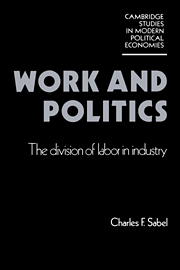4 - Interests, conflicts, classes
Published online by Cambridge University Press: 13 October 2009
Summary
Conflict between labor and capital pervades contemporary life. Workers struggle to raise their real wages, to protect their jobs, to improve their working conditions, or to get promoted. Most of these struggles are so restricted that they do not come to public attention: The 110,665 grievances entered against management by 89,625 unionized workers in eighteen plants of the General Motors assembly division in 1979 are an example. A few, such as wage settlements in inflationary periods, become matters of public debate. Still more rarely, workers' protests shake governments and states: for example, the autunno caldo in Italy and May 1968 in France.
Most explanations of such conflicts draw, deliberately or not, on one of two classic positions in a long-standing debate within social theory. On one side are the moralists. They claim that collective conflict is set off when a group defends an established moral order from outside attack and that it is thus fundamentally conservative or restorative. Their favorite example is the peasant village struggling to defend its tradition against rapacious aristocrats or capitalists. On the other side are the economists. Their claim is that conflict arises from the self-interested pursuit of wealth. For the economist, conflicts are reformative to the extent that they merely redistribute shares of the economic surplus, and revolutionary insofar as they fundamentally change the distribution of rights to the proceeds of economic activity.
- Type
- Chapter
- Information
- Work and PoliticsThe Division of Labour in Industry, pp. 127 - 193Publisher: Cambridge University PressPrint publication year: 1982
- 1
- Cited by

